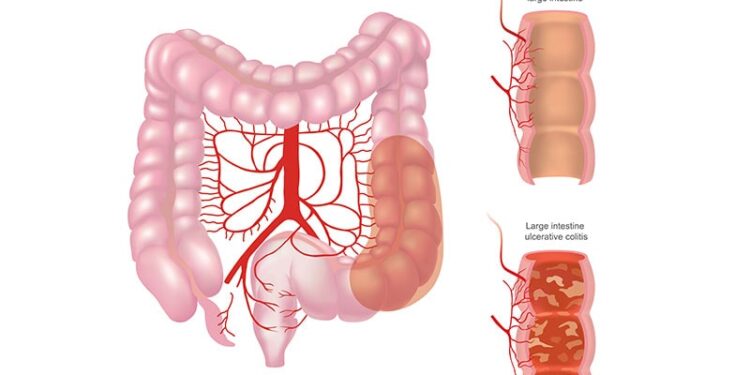TOPLINE:
Compared with the general population, patients with ulcerative colitis (UC) had an additional risk of developing cancer, with about two to three more cases per 1000 person-years, regardless of immunomodulatory treatment status. Variations in the incidence of cancer were particularly noted with age.
METHODOLOGY:
- Researchers conducted a nationwide cohort study using Swedish health registers with prospectively captured data on patients with incident or prevalent UC from routine medical practice from January 2007 to December 2021.
- They analysed 63,925 patients with UC who were matched with 593,072 comparators from the general population without inflammatory bowel disease.
- Exposure to drugs for UC, including thiopurine, TNF inhibitors (infliximab, adalimumab, or golimumab), combined treatment with thiopurine and TNF inhibitors, vedolizumab, ustekinumab, and tofacitinib, was assessed.
- The absolute and excess occurrence of cancer in patients with UC, regardless of their exposure to specific UC medications, was compared with the incidence of cancer in the general population at 1 year after drug exposure.
- Incident cancers, including cancers associated with UC, thiopurine, or TNF inhibitors and other common cancers, were identified using codes in treatment-naive patients and those exposed to drugs.
TAKEAWAY:
- Incidence rate differences for any cancer compared with the general population were 2.66 cases per 1000 person-years in the treatment-naive cohort, 3.38 in the thiopurine-treated cohort, 2.69 in the TNF inhibitor-treated cohort, 2.42 in the thiopurine plus TNF inhibitor-treated cohort, and 2.88 in the vedolizumab-treated cohort.
- The risk for any cancer was higher in the treatment-naive cohort (hazard ratio [HR], 1.12; 95% CI, 1.09-1.16) and in those treated with thiopurine (HR, 1.48; 95% CI, 1.37-1.61), TNF inhibitor (HR, 1.41; 95% CI, 1.24-1.62), thiopurine plus TNF inhibitor (HR, 1.44; 95% CI, 1.19-1.75), and vedolizumab (HR, 1.27; 95% CI, 0.90-1.79) than in the general population.
- The incidence rate differences for any cancer were more pronounced in middle-aged (40 to < 60 years) and older (≥ 60 years) patients, showing 1.76 to 1.57 cases per 1000 person-years in the naive cohort and 3.45 to 9.69 cases per 1000 person-years in the thiopurine-treated cohort. However, the risks were increased in younger patients (18 to < 40 years) but rarely in older patients.
- The highest risks were observed for hepatobiliary cancer across treatment groups (naive, thiopurine, TNF inhibitor, and thiopurine plus TNF inhibitor), followed by colorectal cancer and lymphoma that were noted in all these groups except the naive group.
IN PRACTICE:
“Screening of patients with IBD [inflammatory bowel disease] for other forms of cancer, such as hepatobiliary cancer and basal cell skin carcinoma, has been suggested,” the authors wrote.
SOURCE:
This study was led by Åsa H. Everhov, Karolinska Institutet, Stockholm, Sweden. It was published online on June 02, 2025, in the Journal of Crohn’s and Colitis.
LIMITATIONS:
The follow-up time for assessing cancer was shorter and varied between treatment groups. The study design was not intended to compare treatment groups directly owing to pronounced differences in age and disease severity between different treatment groups. A once exposed-always exposed approach was used, and the actual exposure time was not considered.
DISCLOSURES:
This study was supported by grants from the Swedish Research Council, Swedish Cancer Society, and Regional Agreement on Medical Training and Clinical Research between Stockholm County Council and Karolinska Institutet. Some authors reported receiving financial support or research grants; collaborating on research; and serving as principal investigators, speakers, and/or advisory board members for various pharmaceutical companies.
This article was created using several editorial tools, including AI, as part of the process. Human editors reviewed this content before publication.
Source link : https://www.medscape.com/viewarticle/cancer-risk-high-ulcerative-colitis-varies-age-2025a1000fev?src=rss
Author :
Publish date : 2025-06-11 12:00:00
Copyright for syndicated content belongs to the linked Source.


